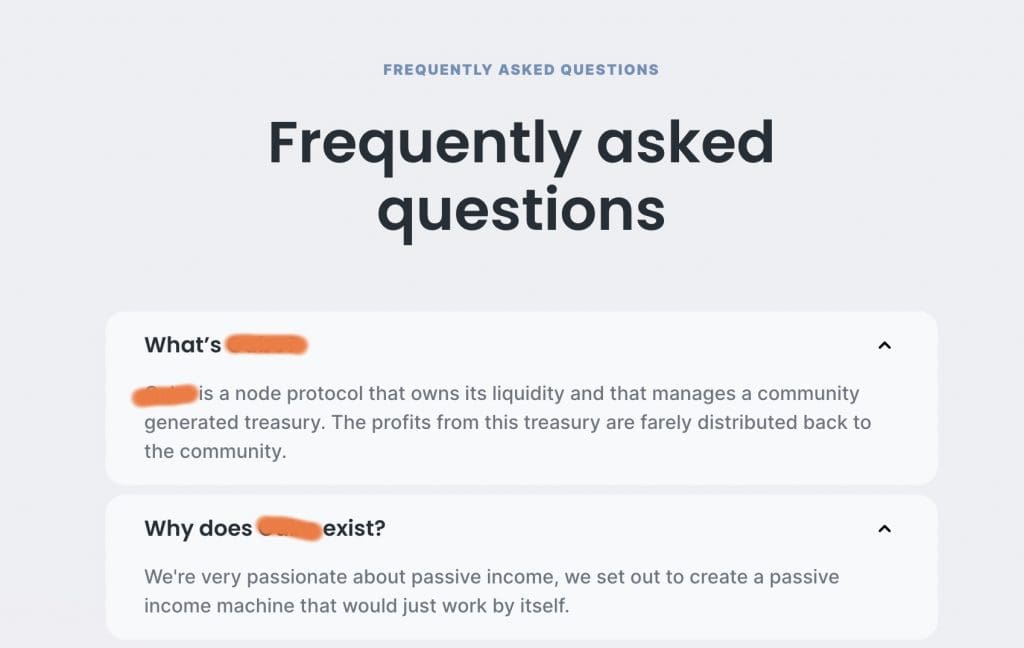Is Crypto a Ponzi Scheme, Pyramid Scheme or Something Else?
A deep dive into crypto in 2022. In our latest guide, we explore whether cryptocurrencies are all Ponzi Schemes ready to topple, or are they sustainable for the long-term?Is Crypto a Ponzi Scheme?
Editor’s Note: 22.08.22 – Minor amends and updates to include links to useful reference material on Ponzi schemes.
Is crypto a Ponzi scheme? It’s a common question that people inside and outside of the crypto space ask, and it’s a fair question. Some even wonder, is crypto a pyramid scheme. Is there any legitimacy to these questions, and if not, why do people think this?
Let’s explore the topic of crypto Ponzi schemes while trying to demystify some of the misconceptions about cryptocurrency in 2022 and its associated technologies.
It is worth noting that this content should be considered financial advice. We have been working in the IT and technology sector for over 30 years. During that time, we have developed insight into the crypto space that we feel others will find useful.
Firstly, what is a Ponzi scheme?
The simplest definition is that they are ‘get rich quick’ schemes. As the old saying goes, if something seems too good to be true, it often is.
People who fall victim to Ponzi schemes are usually attracted to the promise of making money quickly with very little risk.
But how does this work? The idea is that those who get involved in Ponzi schemes early tend to benefit the most. Those who get in late tend to lose out. Think of it like a pyramid where people at the very top of the pyramid are those who got in first. The money from people at the lower levels (i.e. those who come in late) goes to those higher up, essentially funding everybody else.

Image credit – PXHERE. Another analogy is a tower of cards. Without those at the bottom keeping everybody else proposed up, the whole thing comes tumbling down.
Ponzi schemes can be lucrative for investors but only as long as greater numbers of new investors continue to join.
Why do Ponzi schemes fail?
The problem with Ponzi schemes is that it’s almost impossible to tell whether you are in one, let alone whether you are new or late to the scheme. It’s also important to realise that Ponzi schemes don’t actually make a profit, something which most projects need to remain sustainable. The money from new investors simply gets redistributed to those higher up.
It’s only when the money being made by those at the bottom is so unattractive, that they decide to exit the scheme. At that point, the whole thing collapses. Those who got in early will be happy at the money they’ve made, but they will be few and far between when compared to the many people individuals who lost out.
This kind of model only benefits a small number of participants and they are nearly always doomed to fail.
Are Ponzi and pyramid schemes the same and are they a scam?
These two types of schemes are very similar in their characteristics, but not identical.
Both are considered fraudulent investment schemes, therefore a scam. The main difference is that:
- Ponzi schemes require an upfront investment into the scheme with the promise of getting paid at a later date. The availability of funds to pay earlier investors will depend on whether there are new funds coming in from later investors.
- Pyramid schemes are more like a recruitment scheme, where each investor will recruit others to the scheme. Those who join pay their recruiter for giving them the right to participate. And so on…
They both promise high returns (get rich quick) with little risk, but only a very small number of the overall investors actually make a profit.
Sadly, until these schemes fail, investors often aren’t aware that they were participating in a pyramid or Ponzi scheme.
Are schemes like this legal in the UK?
As quoted by gov.uk, Pyramid selling: advice for the public and communities:
“Pyramid selling schemes are illegal, and people who participate in them are likely to lose money.”
Those involved in creating and running these schemes can be prosecuted under UK law.
How can you spot a pyramid or Ponzi scheme?
The following 60-second guide provides some useful advice, but for a quick list of questions to ask, please see below:
- Are you being offered the opportunity to make a lot of money with minimal risk? Sadly, any genuine opportunity to make high returns will incur risk.
- Does it sound too good to be true? If so, it probably is.
- Are you confused by what the scheme actually is? Often those who run or participate in these projects/schemes will provide vague fluffy descriptions or try to confuse you with technical jargon. A recent favourite of mine has been included in the next section below as an example.
- Is the project or scheme simply offering a ‘passive income’? For any project to be successful, it needs to have a purpose other than simply offering a passive income.
- Do you feel as though you are being rushed into joining? If those asking you to join are using hard-sell, high-pressure techniques to make quick decisions rather than giving you time to ask questions and do your own research, alarm bells should be going off.
- Is it difficult to tell who actually owns and runs the project/scheme? Often the originators of pyramid or Ponzi schemes will try to stay hidden to escape any kind of legal action.
- Is it difficult to cash out? You ask to get money cash out, but are then given a list of reasons to keep your money within the scheme – the people in charge will often try to prevent investors from cashing out by offering even higher returns for staying put.
- Are people talking positively (and impartially) about the project on social media and trusted review platforms? Projects that are popular and legitimate will often have large social communities that regularly with the owners. You should also look for positive reviews online, but always consider whether they are genuine. Fake reviews will often come from suspicious-looking profiles, sometimes they will have only added this single review and will provide nothing in their review of any value.
With the exception of the last one, is your answer yes to most of the above questions? If so, there is a very good chance you are being invited to join a Ponzi or pyramid scheme.
If you’re not sure the project or scheme is real, or you are concerned that it could be a crypto scam, check the FCA register to see if they are regulated. You can also consider seeking independent financial advice before you part with any of your money. If you believe you are being invited to join a Ponzi scheme, you can contact Action Fraud to report them.
Is crypto a Ponzi scheme?
Now we have covered the background, we can move on to the purpose of this guide and answer the question, is crypto a Ponzi scheme?
According to CNBC, there are more than 19,000 cryptocurrencies in existence right now and their headline warns that thousands of cryptocurrencies may collapse in a similar fashion to the early dotcom days.
That may very well be true. In any industry or sector, there are good, bad and ugly projects. So let’s assume that a few thousand do collapse, that would be around 15% of failed projects, which is probably to be expected in a relatively new and uncharted industry like crypto.
However, with tens of thousands of crypto projects out there, the list of questions above need to be applied to each of them on a case-by-case basis. Many of these do not show any sign that they are a Ponzi scheme. Of the crypto projects that do fail, there is a good chance that some of these will inevitably be Ponzi-like schemes. The thought here is that early investors are pumping capital into the crypto projects and promise a good return further down the line with little risk involved. When the early investors eventually want to cash out, the money from newer investors is used. Eventually, when there are no new investors left, the crypto project comes tumbling down.
It’s important to understand that not all failed crypto projects are Ponzi schemes though. Some good crypto projects fail purely because the owner loses interest, they get attacked/hacked or funding runs out.
With crypto, there is always a chance that you will lose your investment if the project falls apart. A good example is the Terra LUNA project. LUNA went from being hugely successful and trusted to almost worthless in the space of 48 hours. The cause was numerous huge withdrawals from a DeFi protocol running on Terra’s blockchain causing a downward spiral and the ultimate collapse of the project.
Cryptocurrencies can also subject to pump and dump schemes, which are often orchestrated by external parties to artificially inflate or crash the price and this can create greater than usual volatility.
Many people want to invest in an asset like Bitcoin in order to protect themselves from inflation. Whilst Bitcoin, much like gold, is considered (and proven) to be a great hedge against inflation over the long term, that doesn’t mean it’s safe. The problem is, Bitcoin and crypto markets in general, are subject to huge volatility. When there are major events in the world, like COVID-19, the Ukraine war, or even the crash of Terra LUNA, this can cause crypto markets to tumble.
It is worth learning the difference between Fiat volatility and crypto volatility before investing any of your hard-earned cash.
Bitcoin as a case study
Let’s use Bitcoin as an example and look at whether it resembles a Ponzi scheme and some of its characteristics:
- Has Bitcoin ever claimed to be risk-free? No
- Does Bitcoin serve a real-world purpose? Yes
- Are people talking positively and impartially about Bitcoin? Yes
- Can it be converted to money and cashed out at any time via registered exchanges? Yes
- Is it officially classed as an asset by many countries and is it taxable? Yes
- Does the project have full transparency? Yes, via an open source public ledger available to all at any time
- Can it be earned by mining without having to invest directly? Yes
- Has it stood the test of time? Yes, it has existed for over 10 years and is used as legal tender in some countries
Many informed investors typically invest in crypto projects because of the roadmap and goals of said project. Projects Ethereum such as Cardano focus primarily on using blockchain technology to solve multiple real-world problems rather than promising large returns to investors.
It’s a matter of perspective, but many investors in the crypto space buy into projects that they believe in, not just for financial gain. This is because they feel that there are problems that can be solved as a result of their financial backing.
Always research extensively before spending any money on crypto.

Photo by rupixen.com on Unsplash
What would a crypto Ponzi scheme look like?
I recently came across a crypto project that looked very lucrative and an investment bargain right now with the recent decline in cryptocurrency prices. I’ve scrubbed out the name as I can’t be 100% sure that the project is a Ponzi scheme and I’ve not participated in the project personally. I have also seen reviews and videos of the project saying good things, but my hunch is that these are sponsored reviews.

Ponzi scheme red flags
My first concern is that the description is confusing, “a node protocol that owns its liquidity”. Secondly, they call it a “passive income machine”. This is all on the homepage of the website. I needed to read through the pages several times to see whether I could grasp how the project worked.
For me, I could see various red flags and the project failed to pass most of the questions listed above. In the end, I decided to trust my instinct and stay away.
Is crypto a pyramid scheme?
There are a lot of similarities between pyramid schemes and Ponzi schemes. With pyramid schemes, the process works by each participant recruiting additional members ensuring payment for earlier investors.
With Bitcoin, and most other crypto projects, there are no guaranteed returns for buying coins or tokens. There may be cryptocurrencies out there that resemble pyramid schemes, but that doesn’t mean that crypto as a whole and its associated technologies are inherently Ponzi or pyramid schemes.
Like any type of asset or currency, crypto can be leveraged by those with bad intentions to exploit new investors that aren’t sure what they are buying into.
This is why it is important to research every project that you invest into. Look at the project goals, the roadmap, and tokenomics to fully understand what you are investing in to minimise the chances of being scammed, or losing your investment.
Conclusion
So is crypto a Ponzi scheme? The crypto space is still a relatively new and exciting new area. It’s attracting interest and financial input from around the world, ranging from non-professional retail investors at home to global corporations and investment firms.
It’s not all fun and excitement though. There are definitely some valid concerns that need to be taken into account if you are a new investor in the crypto space or have worries that a crypto project may be a Ponzi scheme.
It’s important to realise that there is a huge range of crypto projects out there and they are largely unregulated. Their teams, objectives and technologies differ substantially, so it’s important to research them and go through the list of questions to qualify whether the project may be a Ponzi scheme.
Huge volatility is commonplace and it’s not unusual to see crypto investments grow or drop significantly. This doesn’t mean that the project is a Ponzi scheme or that it will fail. The table here shows how the top two cryptocurrencies, Bitcoin and Ethereum, have dropped over 70% in value since their peak in November 2021. Projects like Ripple (XRP) have dropped over 90%. If you look back over the history of Bitcoin for example, this kind of volatility is normal.
In summary, we strongly believe that crypto is the future, but that doesn’t mean that any and every project will be successful or legitimate. A huge amount of care should be taken when spending any of your personal finances. Hopefully, you now have a better understanding of crypto as a whole, and how a few small negative projects can impact how people think about the space as a whole.
Reference material
In addition to above, we have added some useful links and reference material for further reading on the topic of Ponzi schemes in general, which should help to further guide you on the topic of whether crypto is a Ponzi scheme:
https://en.wikipedia.org/wiki/Ponzi_scheme
https://www.actionfraud.police.uk/a-z-of-fraud/ponzi-schemes
https://www.moneyhelper.org.uk/en/blog/scams-and-fraud/what-is-a-ponzi-scheme-and-is-it-a-scam
Last modified on: April 17, 2025
Latest Posts

GPU Mining, ASICs & Decentralisation Explained
IntroductionMining cryptocurrency has become a popular way to participate in the crypto and blockchain space while...

Basic Economics & Cryptocurrency Valuation
Why I've Written This Article? One of the most common, and most frustrating, objections (misconceptions) that I hear...

About CryptosRUs and Into the Cryptoverse
This post exploring CryptosRUs vs Into the Cryptoverse for free crypto advice is a little different to others we...

From Everyday People & General Adoption to the Bitcoin Elites: Who Will Benefit the Most?
IntroductionOn 6th September 2023, we published a massive article titled ‘Detailed Analysis of Projected Bitcoin...
Contact us to order your crypto mining rig today
Address
Opace Ltd t/a Crypto Mining Solutions, Park House, Bristol Rd South, Rubery, Birmingham, West Midlands, B45 9AH. UK
Phone
0845 017 7661

ponzi scheme lol. Isn’t everything a ponzi scheme…
Hey guys, Ive been reading this article about crypto being a Ponzi scheme. Is it really? 🤔
Hopefully you’ll know our thoughts if you’ve read the article.
I mean, crypto may have its risks, but calling it a ponzi scheme? That’s a stretch! Lets distinguish between the volatility and speculative nature of crypto and how this is totally different to the characteristics that make up a ponzi scheme. Legit cryptocurrencies allow for groundbreaking shifts in digital finance, gaming, apps, etc, offering decentralization and so much potential for innovation. While it’s true that the market can be unpredictable and sometimes even speculative, it’s incorrect to dismiss the entire concept of crypto as a scam without doing proper research and understanding what it’s all about.
Thanks for the detailed comments Avery, really appreciate the insights. We couldn’t agree more, while Ponzi schemes do exist in all markets, it’s not fair to class the majority of crypto as a Ponzi scheme.